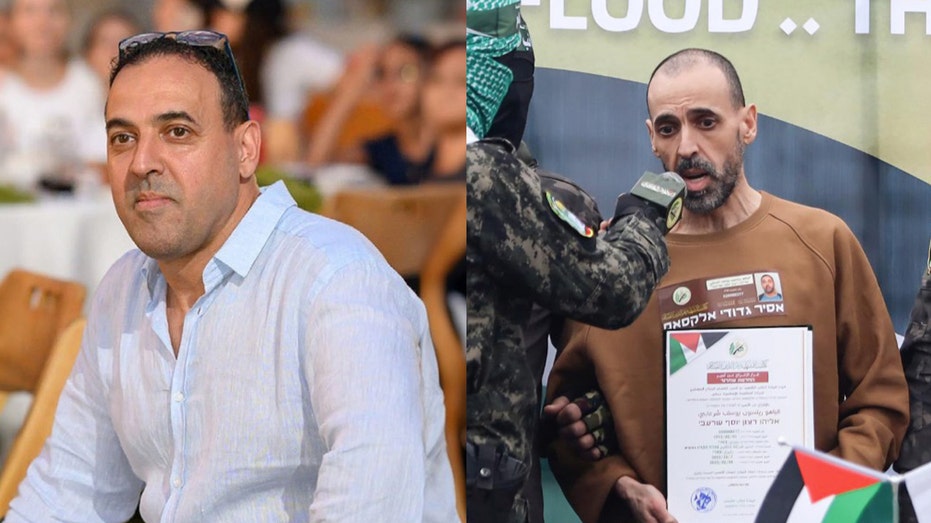
Eli Sharabi Returns Home After 491 Days in Hamas Captivity
Eli Sharabi, who was taken hostage by Hamas on October 7, 2023, has finally made his way back to Israel after a harrowing period of 491 days in captivity. His family welcomed him home with immense joy, but the absence of his wife and daughters—a brutal reminder of the family he lost—cast a profound shadow over the reunion.
The Tragedy of Kibbutz Be’eri
Sharabi lived in Kibbutz Be’eri, a southern Israeli border community that faced catastrophic losses during the October 7 massacre. The attack left 98 residents dead and 30 more kidnapped, significantly impacting a community of just over 1,000 people. The anguish deepened for Sharabi when, in January 2024, it was confirmed that his brother, Yossi, who was also abducted, had been killed during his captivity.
The brutal assault by Hamas not only claimed countless lives but also shattered families and left a lasting mark on the surviving community members.
The Cost of Captivity
During his captivity, Sharabi was forced to participate in a Hamas-organized ceremony where he was coerced into making a statement that he was eager to reunite with his wife and children. Tragically, at that point, they had already been killed during the initial attack. The loss of his beloved wife, Lianne, and their daughters Noiya, 16, and Yahel, 13, created a devastating context for the requirements of his captors.
Another released hostage, Or Levy, remains in turmoil regarding the fate of his wife, demonstrating the psychological toll that captivity has on individuals and families.
Heartbreaking Returns
Sharabi is not alone in his sorrowful return. Yarden Bibas, another hostage released after 480 days in captivity, faces a similar heartache. Captured from Kibbutz Nir Oz, Yarden’s wife, Shiri, and their two young sons, Ariel and Kfir, are still believed to be in Hamas’s custody. A haunting image captured during their abduction showed baby Kfir clinging to his mother, which quickly went viral, bringing attention to their plight.
In his first public statement since being freed, Yarden expressed his deep loss: “Sadly, my family hasn’t returned to me yet. They are still there. My light is still there, and as long as they’re there, everything here is dark,” he lamented. The anguish of separation resonates as he pleads for help to bring back his loved ones.
Manipulation and Psychological Warfare
While in captivity, both Sharabi and Bibas were forced to make statements that manipulated the narrative around their families. Bibas was coerced into appearing in a propaganda video where he falsely reported the deaths of his family, showcasing the psychological warfare tactics that Hamas employs to demoralize captives and their communities. The Israel Defense Forces (IDF) have highlighted these disturbing tactics as part of a broader strategy of psychological intimidation.
The ongoing negotiations have seen some movement, as Hamas included Shiri and the children in a list of potential hostages eligible for release amid a ceasefire agreement. Bibas took a bold step by addressing Israeli Prime Minister Benjamin Netanyahu directly, urging him to prioritize the safe return of his family and others still held captive. “Bring my family back. Bring my friends back. Bring everyone home,” he said assertively.
The Struggle for Remaining Hostages
The homecomings of Sharabi, Levy, and Ben-Ami mark the fifth round of hostage releases since the conflict began, highlighting the fragile progress in negotiations. Upon their release, the condition of the men shocked many; their frail and emaciated appearances elicited comparisons to Holocaust survivors. These images stirred outrage and concern, as Israeli President Isaac Herzog condemned their suffering as a crime against humanity.
Netanyahu responded to the public outcry, expressing his commitment to not ignore the plight of the hostages: “Their condition will not be overlooked.” However, for many families, the pain remains as they wait for news of their loved ones.
Hope Amid Uncertainty
The plight of those still in captivity remains dire. Currently, 76 hostages are believed to be held by Hamas, with many presumed alive. The dynamics of the ongoing ceasefire have allowed for the release of 18 hostages in exchange for more than 550 Palestinian prisoners, illustrating the complexity of the negotiations and the dire reality faced by families on both sides.
Families like that of Ruby and Hagit Chen, whose son Itay remains in Hamas’s grasp, voiced their horror at the disturbing imagery of returning hostages and urged for intensified negotiations to ensure the safe return of those still missing. The struggle continues as families cling to hope, waiting for the day when their loved ones can return home safely.
Conclusion
The return of Eli Sharabi and others, while a cause for celebration, underscores a deeper tragedy stemming from the conflict—a tragic loss of family and a lingering uncertainty for many who remain captives. The emotional toll on returning hostages, vis-à-vis their harrowing experiences, reflects a broader narrative of loss, suffering, and the urgent necessity for resolution. As the world watches, the call for justice, peace, and the reunification of families echoes louder than ever.


















